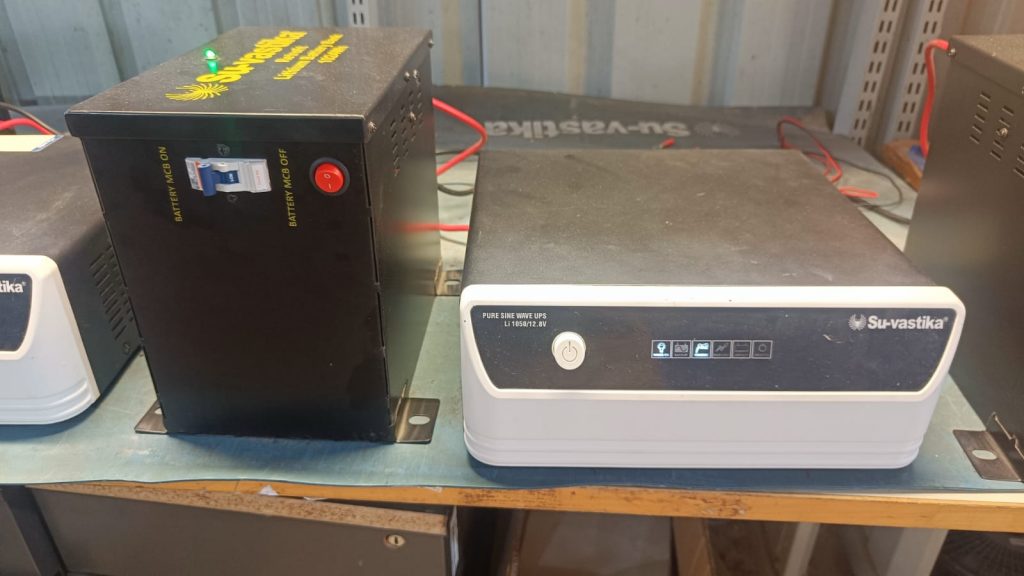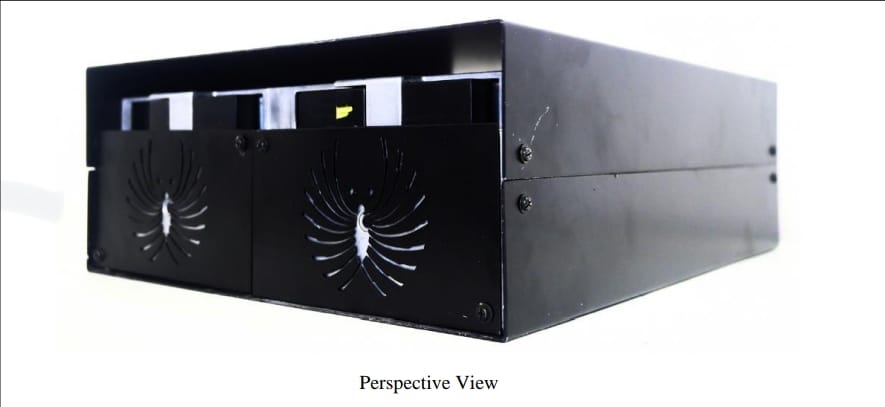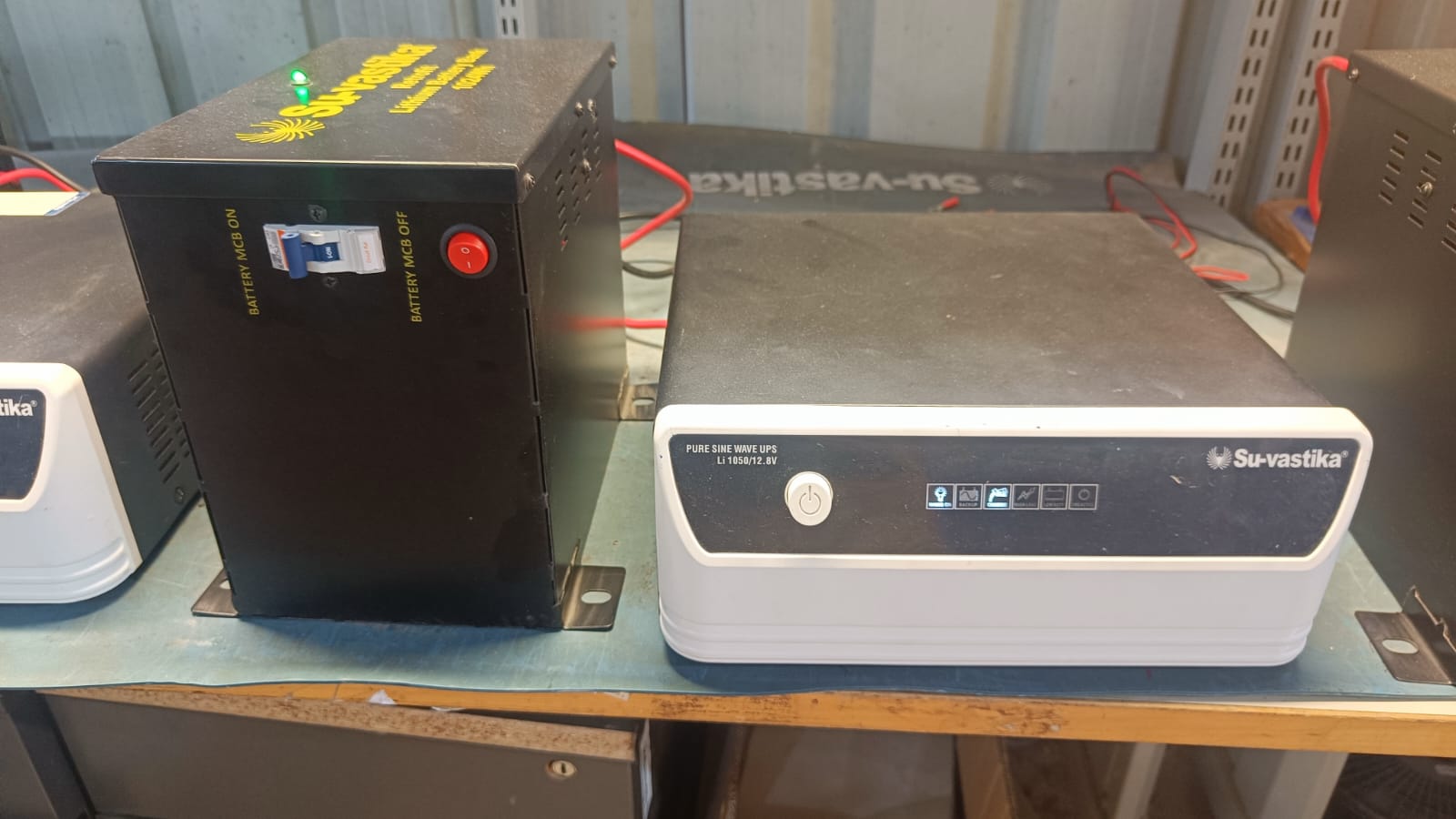


key reasons why Lithium UPS systems are becoming increasingly popular:
- Longer Runtime and Lighter Weight: Compared to traditional lead-acid batteries, Lithium-ion batteries can provide significantly more backup power for their size and weight. This translates to a UPS that can keep your equipment running for longer during a power outage, while being much lighter and more manageable.
Here’s a deeper dive into why Lithium UPS systems offer both longer runtime and lighter weight compared to traditional lead-acid UPS:
Lithium-ion Battery Efficiency:
- Energy Density: Lithium-ion batteries pack more energy into a smaller space. Imagine stuffing more marbles (energy) into a tennis ball (battery) compared to a lead-acid battery (beachball). This allows Lithium UPS systems to store more power without needing a bulky battery bank.
- Less Self-discharge: Lithium-ion batteries lose less stored energy over time when not in use. This means more of the stored power is available to run your equipment during an outage, leading to a longer runtime. Lead-acid batteries have a higher self-discharge rate, so they lose capacity even when just sitting there.
Lithium-ion Battery Design:
- Lighter Materials: Lithium uses lighter elements than lead, making the battery itself inherently lighter. This translates to a lighter overall UPS system for its capacity.
- Simpler Construction: Lithium-ion batteries don’t require the bulky casings and extra materials needed for lead-acid batteries, further contributing to weight reduction.
Combined Impact:
These factors combine to create a Lithium UPS system that’s significantly lighter than a lead-acid equivalent while offering a longer runtime on a single charge. This is particularly beneficial for:
- Portable Applications: Since they’re lighter and more compact, Lithium UPS systems are ideal for powering equipment on the go, like medical devices in ambulances or computers at trade shows.
- Space-Constrained Environments: In server rooms or offices with limited space, a smaller, lighter Lithium UPS can free up valuable real estate.
- Easier Installation and Maintenance: The lighter weight makes Lithium UPS systems easier to install, move, and service, especially for larger capacity units.
2. Lifespan and Lower Maintenance: Lithium-ion batteries typically have a longer lifespan than lead-acid batteries, meaning they need to be replaced less often. Additionally, they are sealed units and require minimal maintenance, unlike lead-acid batteries which can require periodic cleaning and topping up of electrolytes.
Lithium UPS systems boast a clear advantage in lifespan and lower maintenance compared to their lead-acid counterparts. Here’s a breakdown of why:
Lead-Acid Battery Limitations:
- Gradual Degradation: Lead-acid batteries degrade over time, especially when exposed to high temperatures. Each charge and discharge cycle also contributes to wear and tear. This shortens their lifespan to typically 3-5 years.
- Electrolyte Issues: Lead-acid batteries use a liquid or gel electrolyte that needs periodic maintenance. Over time, the electrolyte can evaporate, requiring topping up with distilled water. Additionally, improper handling of the electrolyte can pose safety risks.
- Limited Cycle Life: Lead-acid batteries have a limited number of charge and discharge cycles they can withstand before their capacity significantly drops. This means more frequent replacements are needed.
Lithium-ion Battery Advantages:
- Slower Degradation: Lithium-ion batteries degrade at a much slower rate than lead-acid batteries. They can last 8-10 years or even longer, potentially matching the lifespan of the UPS itself.
- Sealed Design: Lithium-ion batteries are sealed units and don’t require topping up of electrolytes or other routine maintenance. This eliminates the associated risks and simplifies overall system care.
- Higher Cycle Life: Lithium-ion batteries can handle many more charge and discharge cycles compared to lead-acid batteries. This translates to a longer usable lifespan before needing replacement.
Reduced Costs and Improved Reliability:
The extended lifespan and lower maintenance requirements of Lithium UPS systems translate to several benefits:
- Lower Total Cost of Ownership: While the upfront cost of a Lithium UPS might be higher, the reduced need for replacements and maintenance over its longer lifespan can lead to significant cost savings in the long run.
- Reduced Downtime: With fewer maintenance procedures and battery replacements needed, Lithium UPS systems offer improved reliability and less downtime for your critical equipment.
- Simplified Management: The lower maintenance requirements of Lithium UPS systems free up IT staff time and resources that can be focused on other priorities.
While upfront costs tend to be higher for Lithium UPS systems, the advantages in runtime, weight, lifespan, and maintenance can make them a more cost-effective option in the long run.

Leave a Reply